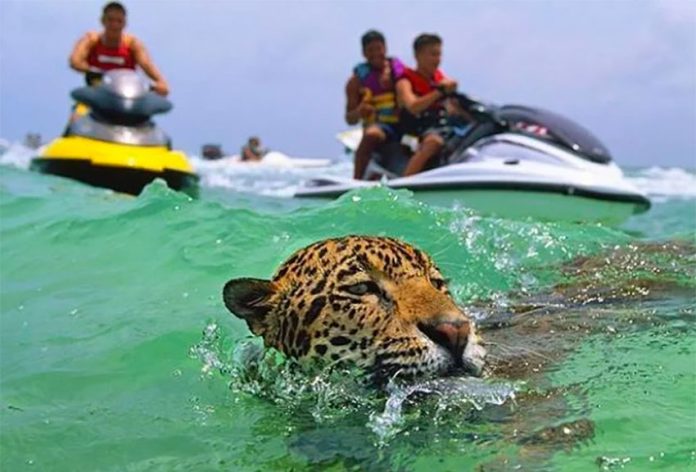Wildlife photographer Steve Winter has denounced the abuse of tame jaguars with which tourists can dive and take selfies in Cancún, Quintana Roo.
The National Geographic photographer posted two of his own photos on his Instagram account that he says serve as evidence of the exploitation of the big cats in the Caribbean coast resort city.
One photo shows two jaguars sitting chained in a boat in Cancún, where tourists can accompany the felines as they swim in the Caribbean Sea.
“Wildlife exploitation practices like this are common around the world and it is important for us to be on the lookout for dodgy tourism operations that promote animal selfies!” Winter wrote in a caption beneath the photo.
“This must stop and it is our responsibility as tourists to not engage in taking pictures with animals. I always ask myself why we do this? It may be a seemingly cool thing to do (take a selfie with a tiger or a leopard or elephant) but there is so much pain, trauma and animal abuse that goes into keeping these animals human friendly. Big cats did not evolve to be ‘friends’ with people,” he said.
View this post on Instagram
Winter warned people to be on the lookout for “animal photo tourism operations,” explaining that there is a “very high likelihood” that places offering “bit cat selfies” are linked to dubious breeding operations and even commercial trophy hunting operations.
A second photo taken in Cancún shows a jaguar in the sea with three men on personal watercraft in the background.
“Jet Ski drivers and their tourists get ready to dive with two tame jaguars in Cancún, Mexico,” Winter wrote in the caption.
“People need to know more about the trade and selfie industry with big cats. From Thailand to South Africa, big cats often represent the face of the wildlife trade. If you see your friends or family partaking in activities like in this picture or petting cubs let them know that such businesses are often linked to breeding programs, illegal trade in body parts and cubs,” he said.
The number of jaguars living in the wild in Mexico has increased to 4,800 from 4,000 in 2010 but the feline is still considered an endangered species. Ecology experts and conservationists have urged authorities to make a coordinated effort to protect the population, which is under threat from poaching, habitat loss and illnesses transmitted by domestic animals.
The National Jaguar Conservation Alliance warned in December that the black market in China is the biggest threat facing jaguars in Mexico and said late last month that there is evidence that the felines are being targeted for their genitals.
Experts have also warned that the construction of the Maya Train on the Yucatán Peninsula presents a risk to the long-term survival of the species.
Mexico News Daily
